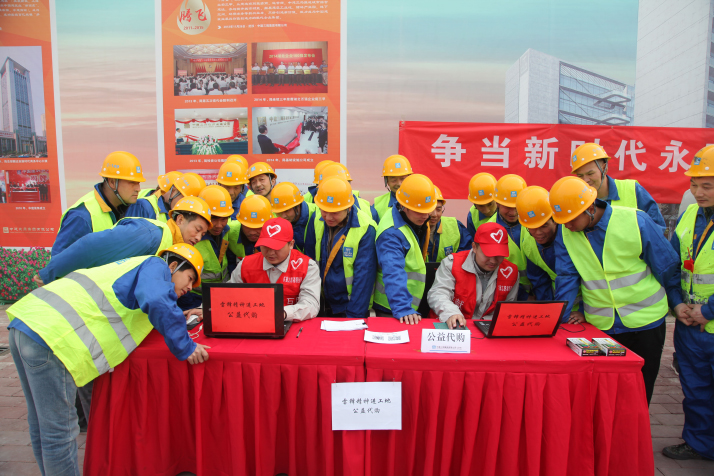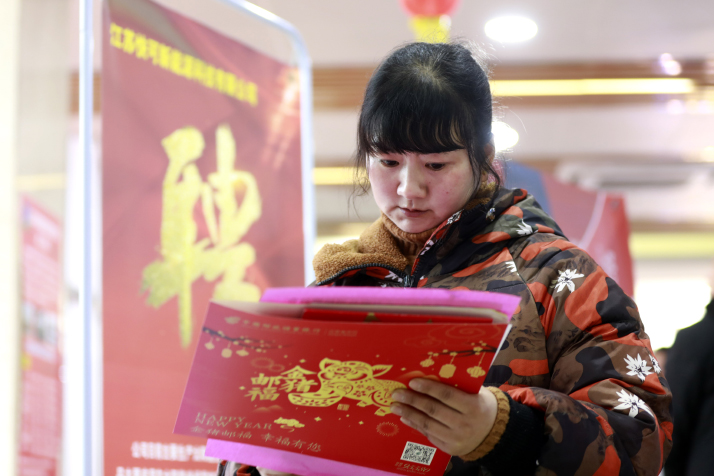| China |
| A Dose of Fresh Blood | |
| New generation of migrant workers with higher education and aspirations pursue integration into urban life | |
|
|
 Volunteers help migrant workers buy articles for daily use online at a construction site in Beijing on March 3 (XINHUA)
As she watched the guard of honor of the People's Liberation Army raise the national flag at Tiananmen Square at dawn, the last thing Luo Yanyun had wanted to see in Beijing was crossed off on her wish list and she was ready to say farewell to the city where she had lived for two years as a migrant worker. Luo had arrived in Beijing from a village in Yongzhou, Hunan Province in central China, to work in a real estate agency, showing and selling apartments to customers. But eventually, the 25-year-old decided to leave the capital and move closer to her family. Besides the family reunion, she also wanted to find a new job where she could utilize what she studied in college—logistics. China has more than 280 million migrant workers, according to the National Bureau of Statistics. Among them, there are nearly 148 million young people like Luo, all born after 1980, who come from rural areas but have some work experience or skills outside the agricultural industry. They are the new face of China's migrant workers. "The new generation grew up while those aged between 40 and 60 gradually withdrew from the labor market and returned to their hometown. So this group is experiencing significant changes," Tian Ming, a professor at the School of Social Development and Public Policy at Beijing Normal University, said. Significant changes Tian said unlike the older generations, the new blood is flocking to cities to improve their lives, not just make money. Today, the economy in rural areas has improved significantly and rural residents, especially those born after 1980, are turning their attention to long-term personal development as well as culture and entertainment. Also, the new migrants have a higher educational background. Almost half of them have received secondary or higher education. Their experience of life while growing up in rural areas is not vastly different from the life of their peers in cities, unlike their parents'. Living in the Internet era, they are world-wise and tech-savvy, using computers, smartphones and other gizmos as proficiently as any city resident. In addition, they have witnessed China's opening up in the past years and this has given them a new confidence and greater ambitions. "China's entry into the World Trade Organization in 2001 and Beijing's hosting of the 2008 Olympic Summer Games have influenced the way of thinking of all young people, including the new generation of migrant workers," Tian said. Believing in the benefits of globalization and growing up on a broader platform, they are confident of their own worth and have or seek a sense of achievement. Therefore, they give more weight to the return they get on their efforts, he said. Their living conditions are also better than the previous generation's as the living standards of all workers have improved. In 2018, the average monthly income of migrant laborers exceeded 3,700 yuan ($526), compared to about 2,600 yuan ($364) in 2013. The attendance rate in preschool and compulsory education has increased among rural workers' children, reaching 83.5 percent and 98.9 percent, respectively. The new generation also shows a strong desire to stay on in cities, which is different from the earlier generations of migrant workers who wanted to return home after they had made some money. That's because the young migrants do not have much experience of agricultural activities or an emotional attachment to the countryside. They like the cities, which, besides greater job opportunities, provide them with better education and medical treatment, as well as facilities like convenient shopping, representing a bright future. Hurdles to overcome When Luo arrived in Beijing, she never thought she would leave as a big city with huge possibilities was what she wanted. However, during the past two years in Beijing, she did not develop a sense of belonging, which upset her. "The reason may be the differences in culture and living habits," she said. Although a report released by the National Bureau of Statistics said migrant workers living in cities have gained an increasing sense of belonging, it is not the same in large cities. In 2018, only 16.8 percent of the new migrants living in cities with more than 5 million people identified themselves as locals, down 1.9 percentage points compared to 2017, according to the report. One reason for this is that many public services in those cities are not accessible to migrant workers since their household registration, commonly known as hukou, entitles them to services available in their hometown alone. A sense of belonging can stimulate migrant workers' potential and improve their production efficiency, enabling them to contribute better, Tian said, adding that this group has definitely contributed to the development of cities and deserves respect and benefits. He suggested that city dwellers have an open-minded attitude toward the newcomers and welcome them instead of looking down on them since that would also make the cities attractive to migrant workers and draw more of them. In May, the Central Committee of the Communist Party of China and the State Council, China's cabinet, announced new measures to promote integrated urban-rural development. They include deepening household registration reforms, relaxing restrictions on urban settlement except for several megacities, promoting coordinated development between cities and towns, as well as increasing the population-carrying capacity and attractiveness of small and medium-sized cities. The authorities pledged that efforts will be made to make cities more inclusive and help migrant workers settle into city life. Many migrant workers are choosing cities near their hometown so that they can take care of their families at the same time. For those returning home, though they are not the mainstream group now, Tian called on the authorities to effectively respond to their needs. He suggested more capital for rural areas to develop infrastructure and employment opportunities, which will give the returnees hope and help them develop at home.  A migrant looks for work in a job fair in Huaian, east China's Jiangsu Province, on January 30 (XINHUA)
New policies At present, most of the new-generation migrants work on the assembly line in electronic and textile factories, or in the service industries. Most of them often need to work overtime. "I seldom had the time to unwind, even after work, which is another reason why I quit," Luo said. Her job meant getting phone calls from customers even when she was off duty. While her agency didn't ask her to do that, she did it out of a sense of responsibility. Social security is another challenge for migrant workers. Tian found during his field research that some corporates do not pay for employees' social security to reduce their operational costs. Many migrant workers, unaware of their rights and the significance of social security, are also unwilling to pay their part of social security. "They are concerned more about having more money in their pockets rather than social security," he said, emphasizing the need to have the measure and its benefits explained to migrant workers. While improving the social security coverage, the government has also begun implementing policies to reduce companies' mandatory contribution to employees' social security. In his Report on the Work of the Government presented before the national legislature in March, Premier Li Keqiang said localities may cut contributions down to 16 percent from 20 percent. The government will make up for the shortfall in the social security fund caused by the cuts. In addition, the authorities have also stepped up organizing training for migrant workers to give them new skills. Luo wants to learn a new language, like Japanese, to have an added qualification while looking for a new job. For such aspirants, the Ministry of Human Resources and Social Security's new plan will ensure appropriate training for registered migrant workers within a month of registration. While priority is given to provide skills training, especially for workers from impoverished areas, the ministry is also providing guidance on e-commerce and business management and operation to those starting their own business. Zhang Lixin, an official with the ministry, told Economic Daily that the manufacturing and modern service industries need a large number of skilled workers. The training will focus on meeting the shortage, so that it becomes job-oriented. The courses will be conducted in cooperation with schools and enterprises for greater effectiveness. Besides, considering the unbalanced development of training agencies in different places, the private sector is being urged to join in and provide the facilities where they are lacking. Migrant workers can then join such courses independently on government subsidy. Copyedited by Sudeshna Sarkar Comments to liqing@bjreview.com |
|
||||||||||||||||||||||||||||
|
